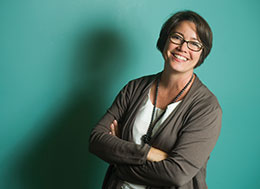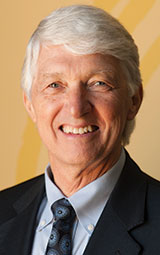Volume 31 · Number 1 · Fall 2013
News & Notes
Full bellies, happy planet

Josette Lewis ’88 is associate director of UC Davis' new World Food Center.
New center aims for hunger-free, healthier world.
With few things in life as important as food and health, UC Davis this summer established a World Food Center to help feed and nurture people in the coming decades.
The big-picture thinking is to do what few universities have done so far — bring together faculty in agricultural and environmental sciences, veterinary medicine, nursing, medicine, social sciences, engineering and management to solve humanity’s most pressing problems in food, health and nutrition. One key will be to do this in sustainable ways.
Located on the Davis campus — in the midst of one of the world’s most fertile growing regions — the World Food Center will seek to connect with outside innovators, philanthropists, industry and public leaders to generate visionary research and practical policy solutions.

Roger Beachy Roger will join UC Davis in January 2014 as founding director of the World Food Center
(Gregory Urquiaga/UC Davis)
Chancellor Linda P.B. Katehi consulted with faculty members and other experts inside and outside the university for nearly two years before establishing the center in June. Then, in mid-July, she gave a briefing to the UC Board of Regents:
“We did this to fully capitalize on our depth and expertise as the world’s leading university for education, research and scholarship on all aspects of food, but especially the nexus between food and health,” she said in her prepared remarks.
The global population is expected to hit 9 billion by 2050, and there’s an urgent need to reform our food production to meet the rising demand. Through the World Food Center, UC Davis can lead the way in developing sustainable agricultural practices and training the next generation of farmers.
After the print edition of the magazine went to press, acclaimed plant biologist Roger Beachy was named the center's founding director.
‘A perfect fit’
An alumna with a background in international development and food security was the center’s first hire.
Josette Lewis ’88, who started as the center’s associate director in August, had a 16-year career at the U.S. Agency for International Development, working in international research and development, then as senior biotechnology adviser and finally as director of the Office of Agriculture, where she played a lead role in developing the Obama administration’s global hunger and food security initiative, Feed the Future.
“The majority of the world’s poor work in agriculture,” she said, so, they can improve their incomes by using better farming practices.
“It helps the world’s food supply; it helps economies; it helps nutrition; it helps society.”
Lewis grew up in Davis (her father worked as associate librarian in the UC Davis School of Law) and graduated magna cum laude from UC Davis with a bachelor’s degree in genetics in 1988, before going on to UCLA where she earned a Ph.D. in molecular genetics in 1994.
In November 2010, after deciding “it was important for me to understand how the private sector works,” she left USAID for a job with Arcadia Biosciences in Davis. And so she was back in her hometown when the World Food Center position opened.
“It was the perfect fit,” Lewis said about her new job.
Sage cuisine
Confucius Institute to promote understanding of Chinese food and beverage culture.
Students and community members will be savoring the flavors of China as a new institute devoted to Chinese food and beverage culture — the world’s first of its kind — gets cooking at UC Davis.
The Confucius Institute at UC Davis, which celebrated its opening in September, will offer courses, public lectures and workshops, and other events on Chinese food and beverage, culture and language.
The institute combines signature strengths of UC Davis and China’s Jiangnan University in food and beverage science and technology, with the goal of promoting understanding of Chinese food and beverage culture. In addition to fostering education and research, the institute will encourage conversation between the food and beverage industries of China and California.
Charlie Shoemaker, a UC Davis professor emeritus of food science and technology with extensive experience in China, serves as director. “The Confucius Institute at UC Davis will expand the efforts of UC Davis to foster diverse and international experiences for its students and the broader community,” he said.
Serving as an honorary adviser for the new institute will be celebrity chef, restaurateur and UC Davis alumnus Martin Yan ’73, M.S. ’77.
Three visiting scholars from Jiangnan University are working with UC Davis representatives this fall to plan the fare for the institute. What’s being explored includes:
- lectures on Chinese tea and cuisine, and the mores of social drinking;
- workshops teaching Chinese cooking; sampling Chinese holiday food; and providing cultural instruction for doing business with Chinese partners, clients and colleagues;
- intensive Mandarin-language learning camps for high school students; and
- graduate student and faculty research opportunities.
Since 2004, the Hanban arm of China’s Ministry of Education has partnered with universities and other organizations to establish more than 400 institutes worldwide to promote understanding of Chinese culture. There are more than 90 Confucius Institutes in the United States including four others in California at UCLA, Stanford University, and San Diego and San Francisco state universities. UC Davis’ institute is the only one focused on Chinese food and beverage culture.
The institutes are named for the iconic Chinese philosopher Confucius (551–479 B.C.), whose teachings espoused individual and governmental morality and correctness of social relationships.
Bottle of risk
Formula-fed infants experience metabolic stress that could make them more susceptible than breast-fed infants to a wide range of health issues such as obesity, diabetes, liver problems and cardiovascular disease, according to new UC Davis research.
A study by biochemists Carolyn Slupsky and Bo Lönnerdal in the Department of Nutrition sheds new light on the link between infant formula feeding and increased risk of chronic diseases later in life.
“We’re not saying formula-fed babies will grow up with health issues, but these results indicate that choice of infant feeding may hold future consequences,” said Slupsky, lead author of the study and also a faculty member in the Department of Food Science and Technology.
The researchers used nuclear magnetic resonance spectroscopy to look at how diet affects compounds in blood and urine in infant rhesus monkeys, which provide an animal model similar to humans in this type of research. After just four weeks, the formula-fed infants were larger than their breast-fed counterparts, had developed distinct bacterial communities in their gut, had higher insulin levels and were metabolizing amino acids differently.
Matchmaking for abalones
In research that incorporates food, sex and danger, scientists at UC Davis’ Bodega Marine Laboratory recently achieved the first successful captive spawning of the endangered white abalone in nearly a decade. The work may be the white abalone’s last chance at avoiding extinction.
Prized by sport and commercial fisheries, the white abalone experienced a drastic population decline caused by overfishing. Currently, males and females are spread so far apart that they have little to no chance of reproducing successfully. In 2001, the white abalone became the first marine invertebrate to be listed as an endangered species. Scientists now believe white abalone are no longer reproducing in the wild.
To solve this problem, the Bodega Marine Laboratory captive breeding program for white abalone was started up in 2010. Researchers encourage the mollusks to breed in an advanced facility that allows scientists to use mood-setting enhancements, like optimum lighting and temperature controls, to cue the abalone to reproduce. In 2012, the program experienced the first successful spawning since 2003, and the lab repeated that success this past spring. There are currently about 60 adult abalone in captivity through the program now.
“UC Davis is the Match.com for white abalone,” said Kristin Aquilino, a postdoctoral scholar at the laboratory.
Killer weed
Rat poison used on illegal marijuana grows is killing fishers, weasel-like animals, in the southern Sierra Nevada, according to a recent study conducted by UC Davis, the U.S. Forest Service’s Pacific Southwest Research Station, UC Berkeley and the Integral Ecology Research Center in Humboldt County.
A study published last summer by a team of UC Davis veterinary scientists documented that rodenticides were being found in the tissues of fishers — cat-sized predators that live in rugged portions of the southern Sierra Nevada. Lead author of that study, Mourad Gabriel, a Veterinary Genetics Laboratory researcher and president of Integral Ecology Research Center, speculated that the most likely source of the poisons was the illegal marijuana grows found throughout the Sierra Nevada.
The new study solidifies that link, showing that female fishers who live in areas with a higher number of marijuana sites had more exposure to rodenticides and subsequently had lower survival rates.
Ancient remedy for modern diet
In Memoriam
Samuel Armistead, Benjamin French, Paul Gumerlock, William Knox, John Owens, Lloyd Smith. . .
Study participants who took a new herbal supplement, while also exercising and controlling their food intake, had greater success in losing weight and slimming down than did those who didn’t take the supplement, report researchers at UC Davis and in India.
The researchers suggest that the supplement — made from extracts of a wild herb and a tropical fruit rind — may be a safe and effective aid for dealing with excess body weight and obesity, which affect more than 60 percent of adults in the United States.
Two clinical trials involving the supplement were conducted at Alluri Sitarama Raju Academy of Medical Sciences in India. Data analysis and study communication was led by Judith Stern, distinguished professor of nutrition and internal medicine at UC Davis.
“The results from our study are promising, and we did not see significant side effects with this supplement extract,” Stern said. “This was a short-term study, and we don’t know what happens in the long run; along with a diet and exercise program, the results may be even greater.”
That mix was made from extracts of the aromatic annual plant Sphaeranthus indicus, a member of the aster and daisy family, and the rind of the tropical fruit Garcinia mangostana, commonly called mangosteen. Both plants have long been valued as having medicinal properties in Ayurvedic medicine — an ancient system of medicine that originated in India.
Funding for the studies was provided by two grants from InterHealth Neutraceuticals Inc. of Benicia
Sea of sameness
Ocean acidification, caused by the burning of fossil fuels, may create an impact similar to extinction on marine ecosystems, according to a new UC Davis study.
The study found that ocean acidification can degrade not only individual species, as past studies have shown, but entire ecosystems. This results in a homogenized marine community, dominated by fewer plants and animals.
The oceans have been growing more acidic from absorption of carbon dioxide from the atmosphere.
“The background, low-grade stress caused by ocean acidification can cause a whole shift in the ecosystem so that everything is dominated by the same plants, which tend to be turf algae,” said lead author Kristy Kroeker, a postdoctoral researcher at the Bodega Marine Laboratory.
She added: “In most ecosystems, there are lots of different colorful patches of plants and animals — of algae, of sponges, of anemones. With ocean acidification, you lose that patchiness. We call it a loss of functional diversity; everything looks the same.”
